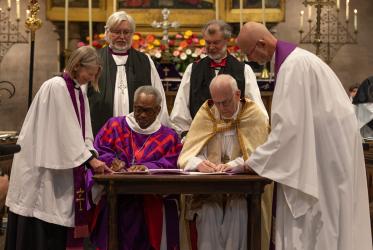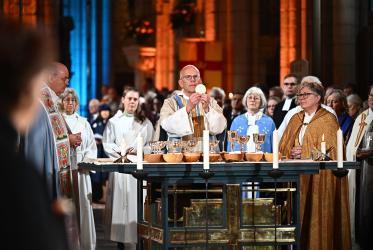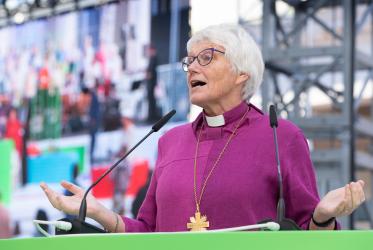Uniting Church in Sweden
Equmeniakyrkan
The Uniting Church in Sweden was formed by a merger of the Baptist Union of Sweden, the United Methodist Church and the Mission Covenant Church of Sweden on 4 June 2011. The temporary name Gemensam framtid (Joint Future) was changed to Equmeniakyrkan during a conference in Karlstad on 11 May 2013.
One of the churches that formed the Uniting Church in Sweden, the Mission Covenant Church of Sweden, was a founding member of the World Council of Churches.
The Mission Covenant Church of Sweden was born in the spiritual revival in the 19th century. The first congregation was founded in 1855, the denomination in 1878. These events marked a protest against the state church system in which the bishops and priests were appointed by the state and the law obliged all Swedes to baptism, membership and communion in the Church of Sweden. The MCCS adopted therefore a congregational character. It was a vital force in the democratization of Swedish society.
With its high ecumenical profile the church has, together with the Church of Sweden (Lutheran), a leading position within the Christian Council of Sweden and is also involved in several bilateral dialogues, ranging from Pentecostals to the Roman Catholic diocese. In 2006 the Mission Covenant Church signed an agreement with the Church of Sweden recognizing "each other as apostolic churches .... holding the same confession of the apostolic faith" and "the same understanding of the sacrements".
The Equmenia Youth is one of the strongest youth movements in Sweden. The vigorous youth work has broad contacts in Swedish society and is an effective form of evangelism and diaconal work.
Mutual cooperation overseas, based on former mission work, is carried out in the two Congos, in Ecuador, India, Japan and Nicaragua. The church maintains contact with several Reformed churches and with churches in the Nordic-Baltic countries or through CEC with other Christian denominations.





